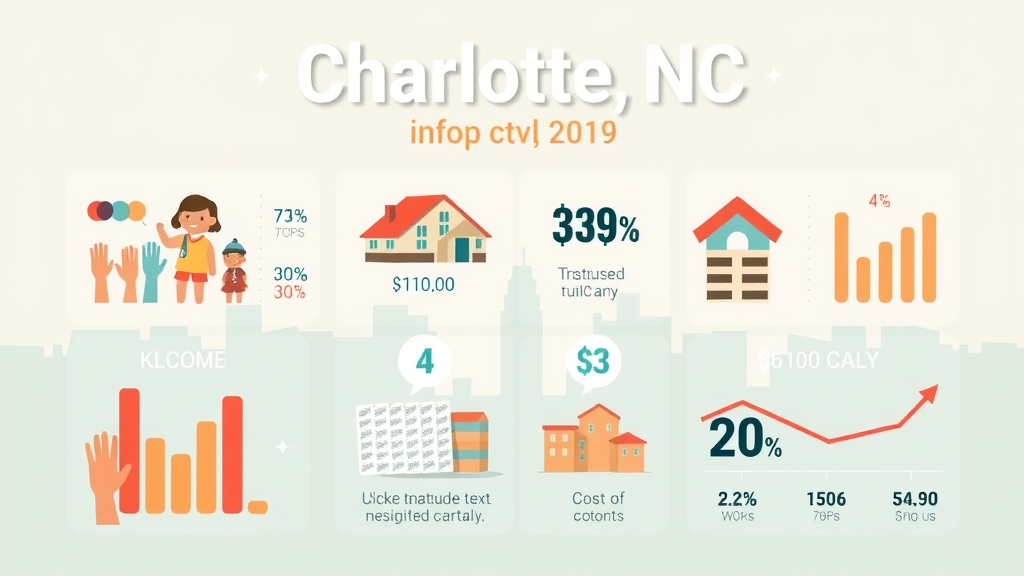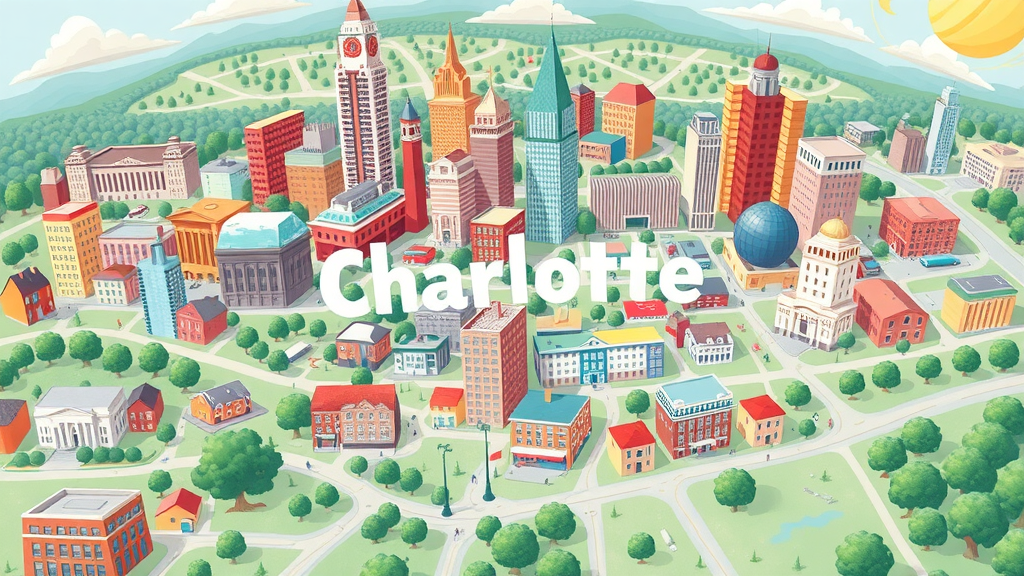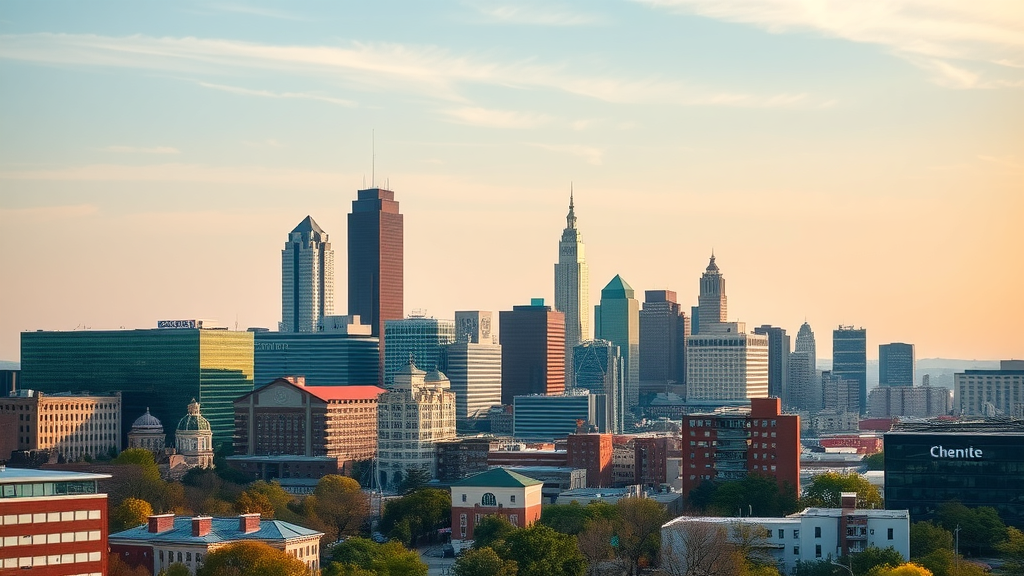- Did you know that Charlotte, North Carolina ranks among the fastest-growing cities in the United States, adding nearly 120 people a day to the 'Queen City'? This rapid influx is changing everything from the job market to the city’s vibe—here’s what you need to know before you join the movement.

What You Need to Know about Living in Charlotte
- Uncover the top things you must be aware of before living in Charlotte, from demographics to the overall pros and cons of living in the Queen City.
Considering living in Charlotte means embracing the energy and opportunity of a big city that still delivers a welcoming Southern vibe. As one of the fastest-growing metros in the United States, Charlotte—known fondly as the Queen City —has rapidly transformed into a hub for finance, technology, and culture in North Carolina. Movers from across the country are drawn by the city's robust job market, diverse population, and expanding amenities, all while seeking a quality of life that's increasingly hard to find in other large cities.
Life in Charlotte offers a blend of urban excitement and laid-back comfort , with green spaces, vibrant arts scenes, and accessible outdoor activities like those at Crowders Mountain State Park, right on the city’s doorstep. However, there are real considerations: rising costs, competitive housing, and increasing transportation stress can challenge even seasoned city dwellers. Get a balanced view of the pros and cons of living in Charlotte and what it truly means to join this dynamic, ever-evolving community before making your move.
Quick Facts and Key Data about Living in Charlotte
| Category | Key Data |
|---|---|
| Population | ~900,000 (city); 2.7 million (metro) |
| Median Household Income | $72,409 |
| Average Home Price | $420,000 |
| Major Industries | Finance (Bank of America, Truist), Tech, Healthcare, Energy |
| Cost of Living | 7% below national average |

10 Pros and Cons of Living in Charlotte, North Carolina
- Get an honest overview of living in Charlotte: cost of living, job market competitiveness, transportation, and lifestyle offerings in the Charlotte area.
1. The Cost of Living in Charlotte Compared to the National Average
| Category | Charlotte | National Average |
|---|---|---|
| Cost of Living Index | 93 | 100 |
| Average Rent (2BR) | $1,590/mo | $1,870/mo |
| Utilities | $165/mo | $180/mo |
| Groceries | Slightly below | Standard |
"Charlotte offers big-city amenities with a cost of living still lower than the national average—but prices are rising quickly as more people move in."
Cost of living is a driving factor for many moving to Charlotte. The city remains about 7% cheaper than the national average , with day-to-day expenses like rent, groceries, and healthcare staying comparatively modest. That said, as Charlotte continues to grow, prices have started to climb—especially for housing and certain goods. For now, however, many transplants find their dollar stretches farther than in most major East Coast cities, especially when comparing against hubs like New York, Atlanta, or Washington, D.C.
Charlotte’s position as a big city with an affordable edge has contributed to its reputation as a great city for those seeking value without sacrificing amenities. While the cost of living is lower than the national standard, analysts and residents alike caution that new arrivals should plan for gradual increases in household budgets over the coming years. From rent to the average price per square foot, anyone planning to live in Charlotte should watch market trends and act quickly when good opportunities arise.
If you're curious about how much you might spend on rent specifically, it's helpful to look at up-to-date figures for the local market. For a detailed breakdown of current rental prices and trends, check out this guide on the average cost of rent in Charlotte to better plan your housing budget.
2. Housing Market: Buying or Renting a Place to Live in Charlotte
- Pros: Diverse neighborhoods, options for urban and suburban living. Cons: Rising home prices, high competition.

The housing market in Charlotte reflects both the city’s dynamic growth and the challenges that come with a popular relocation destination. Prospective residents will find a diverse range of neighborhoods , from the trendy arts ambiance of NoDa to family-friendly Ballantyne or historic Plaza Midwood. Whether you prefer urban charm or suburban tranquility, Charlotte offers plenty of choices for your preferred lifestyle.
The downside? Rising home prices and high competition have become a real concern. Bidding wars are common for homes in sought-after neighborhoods, and rental rates are inching up as well. Prospective homebuyers and renters alike should be prepared with pre-approvals and quick decision-making. Despite the surge, housing in Charlotte is still generally more accessible than in other large cities—and the neighborhoods each come with distinct amenities and a sense of local pride that makes “finding your fit” easy for most.
For many newcomers, the journey to find a place to live in Charlotte is equally exciting and daunting. A good real estate agent, diligent online research, and flexibility can be your best assets in this market.
3. The Job Market and Unemployment Rate in the Charlotte Area
- Finance, tech, healthcare, and a lower-than-the-national unemployment rate make Charlotte a magnet for career-minded individuals.
Charlotte has established itself as a powerhouse on the East Coast for finance, technology, and professional services. Home to corporate giants like Bank of America and Truist, the city boasts a job market that draws talent from across the country. Unemployment remains lower than the national average , thanks also to growing healthcare and tech sectors, plus a lively startup ecosystem.
For those seeking security and career mobility, living in Charlotte means access to a flexible job market with opportunities at all skill and experience levels. Advanced manufacturing, energy, and education round out the options, contributing to a healthy and varied employment scene. Newcomers can plug into professional networks quickly and benefit from robust business development resources and coworking spaces.
The Queen City’s reputation as a great place to live for professionals rests not just on the presence of big firms, but on consistent wage growth and business-friendly policies. If your goal is upward mobility or breaking into new industries, Charlotte offers tangible pathways and the right climate for long-term job security.
4. Public Transportation and Commuting in Charlotte
- Light rail, bus system, highway access—benefits and frustrations for daily commuters.

Public transportation in Charlotte is functional but has room to grow. The LYNX Blue Line light rail is a standout, offering convenient north-south travel for much of the city and linking major hubs with less traffic hassle. The Charlotte Area Transit System (CATS) provides comprehensive bus service year-round, connecting neighborhoods and employment centers throughout the metro.
For drivers, Charlotte’s extensive highways make commuting by car fairly straightforward, but as the population swells, so do traffic congestion and commute times. Many residents find themselves spending longer periods on the road during rush hour, particularly for those living in the suburbs or outer neighborhoods. Urban sprawl and a growing number of commuters highlight the need for ongoing investment and innovation in transit infrastructure.
The city is actively improving mobility options, but if you rely heavily on public transportation or prefer walkable city living, you’ll want to research neighborhoods and routes before moving. Biking and rideshares are growing in popularity, especially for those working in Uptown or South End.
5. Education and Schools in Charlotte, North Carolina
- Variety in public and private education, with a focus on magnet and charter schools.

If you’re moving to Charlotte with children or planning to pursue higher education, you’ll find a range of educational opportunities at all levels. The Charlotte-Mecklenburg Schools (CMS) district is one of the country’s largest and offers a medley of public, magnet, and charter schools —many of which have earned national recognition for their programs. Private education is also robust, including religious, Montessori, and STEM-focused institutions.
The area is home to several colleges and universities, including the University of North Carolina Charlotte (UNCC), Queens University, and Central Piedmont Community College, supporting both traditional and non-traditional students. Parents consistently emphasize the value of neighborhood research—school zoning can heavily influence real estate decisions as academic performance varies across districts.
Ultimately, Charlotte encourages educational innovation and excels in offering choices. Families moving into the Charlotte area should explore all available options to meet their children’s academic and extracurricular needs.
6. Lifestyle, Nightlife, and the Unique Vibe of Living in Charlotte
- Restaurants, breweries, arts, green spaces, and sports—the 'Queen City' is anything but boring.

Life in the Queen City is dynamic. Whether you’re an avid foodie, a craft beer enthusiast, or an arts lover, living in Charlotte offers plenty to keep your days—and nights—vivid. The city is packed with celebrated restaurants, popular breweries, comedy clubs, museums, and music venues, with hot spots like South End, NoDa, and Plaza Midwood leading the way in culture and entertainment.
Charlotte’s green spaces—including Freedom Park, the Rail Trail, and proximity to gorgeous areas like Crowders Mountain State Park—balance urban excitement with plenty of room to relax or get outdoors. Sports fans can catch the Carolina Panthers (NFL) or the Charlotte Hornets (NBA), and community festivals fill the calendar year-round.
The real draw is the friendly, laid-back vibe that binds the city’s neighborhoods together. Whether you’re bar-hopping or hiking, Charlotte offers a quality of life that many quickly come to love.
7. Weather: What’s it Like to Live in Charlotte Year-Round?
- Four seasons with mild winters and hot, humid summers. Occasional severe storms to consider.

Charlotte boasts four distinct seasons , with generally mild winters—rarely dropping below freezing—and long, sunny spring and fall stretches. Summers can be steamy, often reaching the high 80s and 90s, matched by humidity typical of the Southeast. Storms are a consideration, with occasional severe weather in spring and late summer; hurricane remnants can bring heavy rain, but direct hits are rare in this inland location.
The favorable climate makes it easy to enjoy Charlotte’s many outdoor amenities and weekend escapes to the Blue Ridge Mountains or coastal Carolina beaches. Winter brings brief spells of cold, but snow is infrequent, and most days remain comfortable for outdoor activities.
For those prioritizing climate as a component of quality of life, Charlotte stands out among large cities—offering enough variety to keep the seasons interesting without the extreme weather disruptions found elsewhere.
8. Diversity and Community Spirit in the Queen City
- Rapid growth adds vibrancy but challenges integration. Discuss neighborhood diversity and inclusivity efforts.
As the Queen City draws new residents, it has grown increasingly diverse . People from across the U.S. and around the globe contribute cultural richness that’s visible in local businesses, international cuisine, and a broad tapestry of community events. This diversity energizes the area, fostering new friendships and collaboration throughout neighborhoods.
Charlotte is working to ensure that rapid population growth is paired with inclusivity and integration. Many neighborhoods host cultural festivals and community meetings, and citywide programs support affordable housing and minority-owned enterprises. Still, housing affordability and social equity remain ongoing challenges.
For newcomers seeking a welcoming environment, the city’s visible efforts at inclusivity make living in Charlotte attractive. Engaged residents and active neighborhood associations also drive a strong sense of belonging and safety.
9. Opportunities and Challenges of Moving to Charlotte
- Moving to Charlotte: How the influx of newcomers is changing the Queen City landscape for better—and sometimes for worse.

Moving to Charlotte offers a world of opportunity, from booming jobs to a high standard of living. The influx of new residents has sparked innovation, enriched local culture, and fueled investments in infrastructure, retail, and recreation. For many, this growth is the very reason the Charlotte area feels fresh and full of promise.
Yet change comes with complications: urban sprawl , construction-related congestion, and a shifting sense of “home” among long-time residents. Gentrification has displaced some families, and the pace of transition can leave services playing catch-up. The challenge for Charlotte is balancing growth with sustainability and quality of life for everyone.
For those considering the move, being proactive—researching neighborhoods, building community early, and keeping an eye on market trends—will help you capitalize on the Queen City’s many advantages while navigating its growing pains.
10. The Cons of Living in Charlotte—What Could Hold You Back
- Traffic, rising costs, urban sprawl, and the evolving public transit system remain pain points for some.
While the overall quality of life in Charlotte ranks high, there are notable cons of living here. The city’s surging growth has led to traffic congestion not unlike what you’d find in any big city, with peak travel times made worse by ongoing development projects and limited public transportation expansion. Navigating commutes or outer neighborhoods can be difficult, making car ownership a virtual necessity.
The cost of living—especially housing—has risen markedly, sometimes outpacing wage growth for certain industries. Urban sprawl means longer travel times and less centralized amenities, which some find challenging in contrast with more compact metropolitan areas. Infrastructure improvements are underway, but those moving soon should expect some “under construction” phases as Charlotte adjusts to its booming population.
Even with these challenges, most Charlotte residents agree that the advantages far outweigh the negatives, particularly if you choose your neighborhood and timing strategically.
The Charlotte Area: Best Neighborhoods and Places to Live
- South End, Uptown, Ballantyne, NoDa, Plaza Midwood—explore the character, amenities, and average cost of living in each to find your fit in the Charlotte area.

If you’re hunting for the best places to live in the Charlotte area, start with research into top neighborhoods that align with your lifestyle and budget. South End is a favorite among young professionals and creatives for its walkability, nightlife, and access to transit. Uptown serves as the city’s bustling business district, ideal for those who want to be at the heart of it all.
Ballantyne , with its newer development, top-rated schools, and suburban atmosphere, appeals to families prioritizing space and community amenities. NoDa (the North Davidson Arts District) is Charlotte’s gritty, eclectic hub for arts and live music, while Plaza Midwood offers a blend of historic charm, local eateries, and unique boutiques. Each neighborhood has a distinct vibe and a range of home prices, making comparison shopping essential to find your perfect fit.
When evaluating your place to live , consider commute times, school options, proximity to green spaces, and access to local business and recreation hubs. Charlotte’s diversity and growth mean there’s a neighborhood for nearly every preference.
Moving to Charlotte: Tips for a Smooth Relocation
- Planning your move to North Carolina? Insights on logistics, housing searches, and resources to help you start living in Charlotte with confidence.
The first step to a seamless relocation is thorough planning. Investigate neighborhoods that match your quality of life goals, and begin the housing hunt early—inventory turns over rapidly in the best areas of Charlotte. Leverage online platforms, local realtors, and relocation consultants to streamline your search.
Investigate moving companies well in advance, read reviews from other Charlotte residents, and get multiple quotes to avoid last-minute surprises. If possible, schedule your move during off-peak times (spring or fall) to save on costs and reduce competition for moving resources. Once you’re here, tap into community groups, professional networks, and neighborhood social media for insider tips and connections.
Finally, get involved early—attend local events, open houses, and farmer’s markets. Charlotte offers a warm welcome for newcomers willing to embrace the city’s pace and culture.
People Also Ask about Living in Charlotte
Is Charlotte NC a good place to live?
- Yes; Charlotte’s thriving job market, affordable cost of living, and dynamic culture make it a desirable city. But, like every city, it has its share of challenges such as urban sprawl and growing pains.

Many newcomers find Charlotte offers an appealing mix of economic opportunity, vibrant culture, and friendly neighborhoods. Its job market is robust, and there’s a unique sense of belonging that sets it apart from many other large cities . However, rapid growth demands adaptability and patience as the city evolves.
What salary do I need to live comfortably in Charlotte, NC?
- A family of four typically needs $72,000–$85,000 to live comfortably in Charlotte, reflecting average rent, groceries, transportation, and childcare costs.
The ideal salary for living comfortably in Charlotte depends on your lifestyle and housing choice, but for most, $72,000 to $85,000 covers rent or mortgage, transportation, food, and routine expenses. Singles or couples may need less, but it's a good benchmark for families wanting to maintain a comfortable quality of life.
What are the biggest issues in Charlotte, NC?
- Traffic congestion, affordable housing shortages, and rapid gentrification are the primary challenges affecting residents living in Charlotte.
The most pressing challenges remain traffic congestion , affordable housing shortages, and the pace of change brought about by population growth. While addressing these concerns is high on the city’s agenda, new residents can expect periods of adjustment as solutions are put in place.
What is the vibe in Charlotte, NC?
- Charlotte offers a vibrant blend of Southern charm, urban excitement, and diverse cultures, earning its place as a friendly, progressive city with a laid-back energy.
The overall vibe is progressive, energetic, and inviting—Charlotte is a big city with a small-town heart. The blend of new ideas, Southern hospitality, and creative energy makes it a favorite among those looking for community and excitement in equal measure.
Frequently Asked Questions about Living in Charlotte
- What’s it like to raise a family in Charlotte? How does public transportation compare to other North Carolina cities? What is unique about the Queen City's community feel?
Raising a family in Charlotte is made easier by many family-friendly neighborhoods, safe parks, and a variety of school choices. Compared to other major North Carolina cities, Charlotte’s public transportation is growing but still car-centered; plans for expansion are underway. The truly unique element is Charlotte’s diverse and active community spirit, propelled by new arrivals bringing fresh perspectives and energy.
Many residents appreciate the blend of opportunity and friendliness, making it a great city for long-term living or starting the next chapter of your life.
Expert Tips and Key Takeaways for Living in Charlotte
- Plan for neighborhood research, budget for rising costs, leverage job market networks, and embrace Charlotte’s unique culture to truly thrive.
"If you’re looking for opportunity, energy, and a community on the move, living in Charlotte is hard to beat—just be ready for its rapid changes."
Invest time in researching neighborhoods before you move, and be realistic about budgeting for rising expenses. The job market is competitive, so leverage professional and social networks to your advantage. To make the most of your new city, embrace its unique culture—get involved, explore, and build connections from day one!
Keep an open mind and a flexible approach. Charlotte is changing rapidly, but for many, that’s part of its charm and its promise.
Next Steps: Make the Most of Living in Charlotte
- Considering a move? Use our relocation checklist, connect with local organizations, and immerse yourself in all that the Queen City offers. Start living in Charlotte and experience why so many are calling it home.
Take action—reach out to local experts, explore neighborhoods, attend city events, and get ready to call Charlotte, North Carolina your new home!
As you prepare for your move or settle into life in Charlotte, remember that each neighborhood offers its own unique rhythm and sense of community. To truly understand what daily life feels like across the city’s diverse areas, explore this in-depth look at what living in Charlotte neighborhoods is really like . Discover local perspectives, hidden gems, and tips that go beyond the basics—helping you make the most of your Queen City experience. Whether you’re seeking vibrant nightlife, family-friendly streets, or a creative arts scene, Charlotte’s neighborhoods are ready to welcome you and shape your next chapter.
Sources
- https://www.charlottenc.gov – City of Charlotte Official Site
- https://www.charlotteobserver.com – Charlotte Observer
- https://www.zillow.com/charlotte-nc – Zillow Charlotte Market Trends
- https://www.census.gov/quickfacts/charlottecitynorthcarolina – US Census Bureau
- https://www.bestplaces.net/city/north_carolina/charlotte – Best Places to Live in Charlotte
 Add Row
Add Row  Add
Add 




Write A Comment